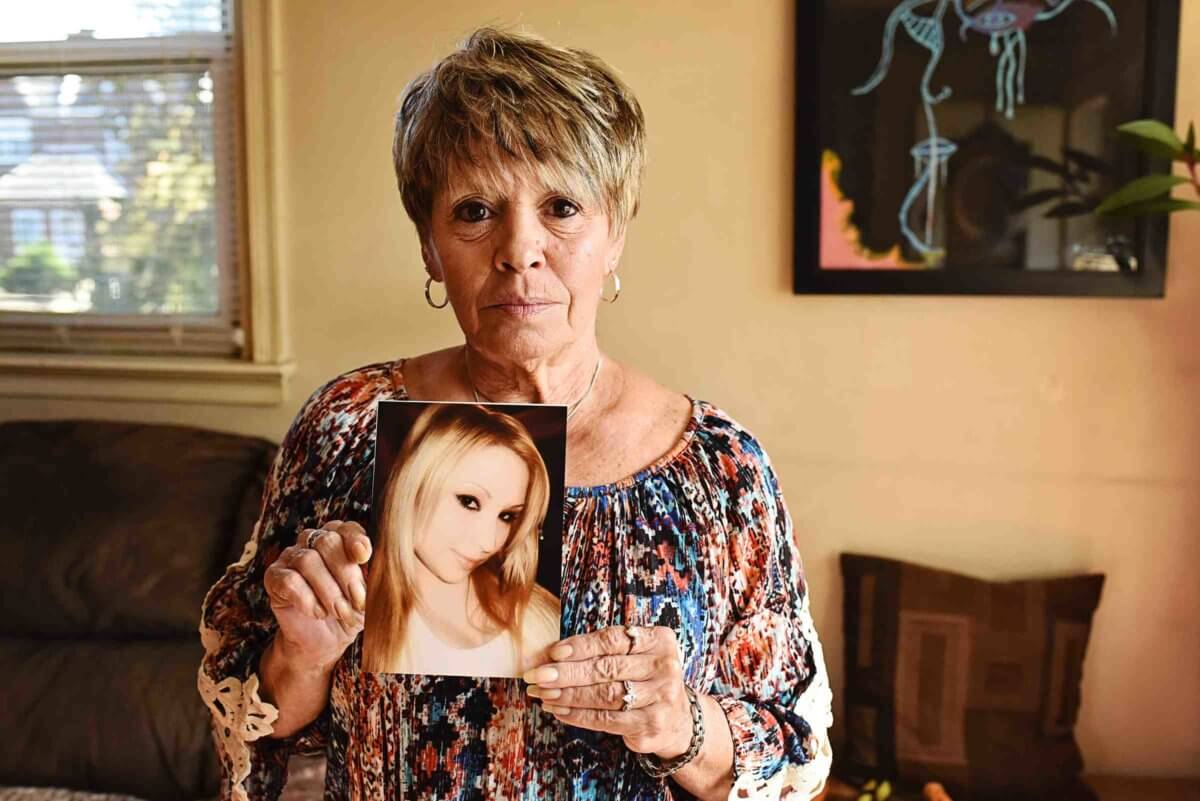A civilian oversight agency’s review of the death of a woman in an abusive relationship with a Philly cop raises serious questions about the official finding that she killed herself, experts say.
But it remains unclear if any action will be taken related to Philadelphia’s Police Advisory Commission (PAC) review of the death of Erica Koschman, 29, inside a home she shared with Philly cop Joseph Sanchez.
“I had just gotten off the phone with her. She said she was coming home, her car was packed,” Sharon Koschman, the victim’s mother, recalled in a crowded Dunkin Donuts in Northeast Philly. “Nineteen minutes later, I get a phone call from her cell number, and it’s him, screaming at me that Erica killed herself.”
Koschman never accepted the medical examiner’s official finding that her daughter’s death was a suicide. After asking officials to review the case for years, she contacted PAC in 2015. In July 2017, PAC’s then-interim Executive Director Erica Atwood issued a series of recommendations related to the investigation to Police Commissioner Richard Ross.
“Every suicide/homicide investigation, including those where the partner or spouse of the decedent is an officer, should be treated according to protocol and uniformly,” PAC wrote in its recommendations.
According to the commission’s review, that did not happen in the case of Erica’s death.
PAC noted missteps such as the fact that officers almost immediately treated the death as a suicide, Sanchez’s history of abusing Erica was ignored, crime scene blood spatter may have contradicted Sanchez’s account of the death, his hands were not tested for gunshot residue, and he was allowed to “roam” the house as police investigated.
“There are serious questions raised about the integrity of the police investigation into her death,” said civil rights attorney David Rudovsky after reviewing the PAC report. “When you’ve got this many red flags in a single investigation, where there is an issue of whether a police officer may have been involved or not, that ought to be of the highest concern to the police department.”
In his response to PAC’s recommendations, Police Commissioner Richard Ross wrote, “I agreed that standard protocols should be established and implemented when conducting suicide investigations.”
But it appears that despite the breaches of protocols in the investigation, three additional reviews upheld the original finding of suicide.
“While the case was not ‘reopened,’ it was reviewed by our Internal Affairs Division, the Office of the Chief Inspector of the Special Investigations Bureau (which, after a departmental reorganization, now exists as the ‘Investigations Bureau’), and the District Attorneys Office,” said Capt. Sekou Kinebrew.
The Philadelphia DA’s office has the authority to potentially re-open old investigations, but as policy can neither confirm nor deny any pending investigation, a spokesman said. Sanchez could not be reached for comment.
“The evidentiary findings at the scene are not consistent with the account given by the reporting party [Sanchez],” said Professor Kimberlee Moran, director of forensic science at Rutgers University-Camden, who reviewed Erica’s death report and the PAC’s recommendations. “It sounds like the spatter is all around ground level, yet he says she was standing in the doorway. … Statistically, it’s pretty rare for females to commit suicide with a gun.”
Friends of Erica denied she was suicidal. They said she was an aspiring hairstylist and model who in the days before her death had gotten a new job and was planning a trip to California.
“The fact that it says suicide — it bothers me every day. Anyone who’s ever met Erica knows better,” said friend Tara Selletti. “At the funeral, all of us came together and shared stories … it just spelled out a long history of abuse.”
“We tried to get her out of it multiple times, but she was too afraid of anything happening to us,” said friend Ashleigh Deriscavage. “She was terrified of Joey, she was terrified of leaving him, because she knew he could do things, he had strings he could pull. That’s why she went to the hospital and didn’t report it to the police department. She was afraid.”
Koschman stated that she is not accusing anyone of anything, but she just wants to know what really led to her only child’s death.
“I don’t know if he did this, if it was an accident. You don’t know what story to believe,” she said. “All I want is the truth.”
Timeline
-May 2010: Erica Koschman and police officer Joseph Sanchez begin a relationship and eventually move in together within the 15th District, where Sanchez was assigned.
-Dec. 16, 2011: Koschman goes to Nazareth Hospital complaining of being abused by her boyfriend, but refuses to make a police report. She tells friends she was shoved down the stairs while carrying a Christmas tree.
-Jan. 11, 2012: Koschman has scheduled a counseling appointment for Sanchez, and calls her mother saying she is moving home. Around 1:30 p.m., Koschman dies from a gunshot wound to the dead, which the Philadelphia Police Department and Medical Examiner’s Office determine to be a suicide.
-Jan. 23, 2015: The Police Advisory Commission opens an inquiry into the death of Erica Koschman.
-Sept. 21, 2016: Sanchez files a lawsuit against 6ABC for defamation and libel related to an interview with Sharon Koschman, and claims that, contrary to Nazareth Hospital records, “There was no history of domestic violence … there is no hospital emergency room report indicating domestic violence-related injuries.” The lawsuit is later withdrawn for unspecified reasons. 6ABC did not respond to requests for comment.
-July 27, 2017: PAC releases recommendations that the police department follow standard protocols in investigations of deaths that involve officers, which they establish did not occur in this case.
Flawed investigation?
Police did not investigate the “documented history of domestic violence involving Koschman and Sanchez,” PAC wrote.
Beyond Erica reporting to friends that Sanchez had thrown his cell phone at her face and shot his gun into their mattress, she also went to Nazareth Hospital on Dec. 16, 2011, with complaints of being abused by her boyfriend.
“Once police were called to respond, she refused to press charges,” PAC wrote. “One nurse reported that ‘patient was crying,’ ‘a man was on the telephone yelling profanities at her,’ and ‘afraid to call police because boyfriend is a police officer.'”
Erica later posted pictures of her bruised legs and told friends Sanchez had shoved her down a flight of stairs while she was carrying a Christmas tree.
On the day of her death, Erica “had scheduled an appointment for Sanchez with the PPD assistance program for counseling,” PAC wrote.
Sanchez gave two accounts of Erica’s death. He told police that Erica had tried to overdose on sleeping pills and vomited. Later, he saw her holding his gun in the bedroom doorway, ran away, and heard a shot.
He told a fellow officer a different version. “Erica had his service gun in her hand. He tried to get it away from her but couldn’t. The gun went off and ‘it was a mess,'” Sanchez told his fellow officer, according to PAC.
Retired police Det. John McDermott said in one interview “that he was bothered by the fact that the blood spatter did not match the account that Sanchez had given,” PAC wrote.
Additionally, sleeping pills were not found in post-mortem toxicology reports.
Read PAC’s recommendations related to Erica Koschman’s death at phila.gov/pac.




























